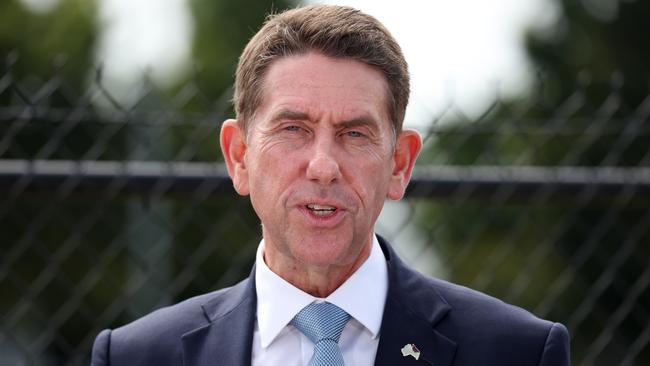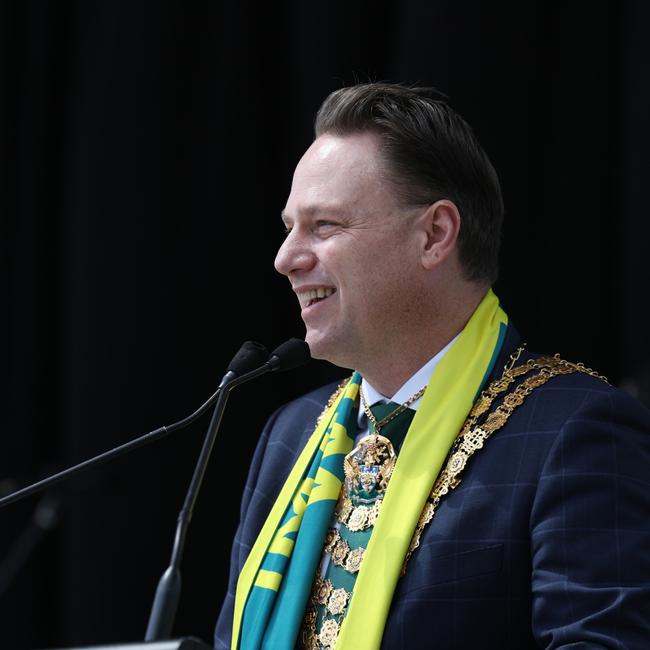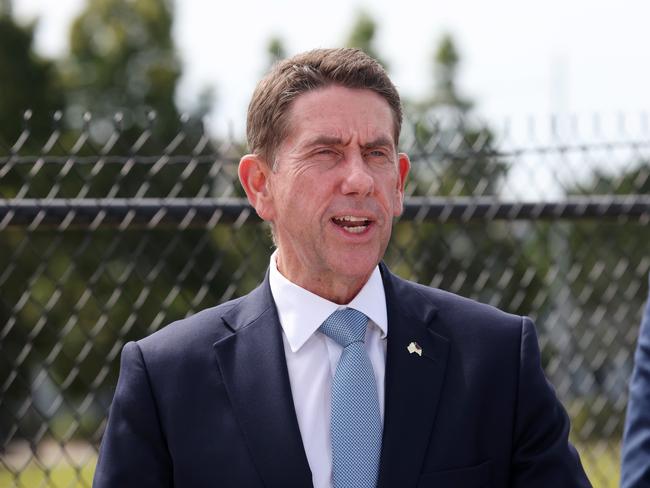Editorial: Treasurer lucky he had mining tax, night commish a premier appointment
Treasurer Cameron Dick was scathing about a Brisbane City Council blowout that turned out to be much more modest than his own, writes the editor.

Opinion
Don't miss out on the headlines from Opinion. Followed categories will be added to My News.
When Brisbane Lord Mayor Adrian Schrinner announced last October a range of cuts to ensure his council budget would stay balanced during this time of unavoidable soaring costs, Cameron Dick was scathing.
The Treasurer took to his feet in state parliament and accused Cr Schrinner of having “imposed $400m in savage budget cuts on the people of Brisbane” – “a hammer blow to confidence in our capital”.
Mr Dick assured Queenslanders they would be saved from “broken promises and cuts” in the Budget he oversaw because he had craftily raised $7bn through an unexpected extra tax on miners – the equivalent of 10 per cent of his spend, the same proportion of its budget that council had to find via its cuts program.
The Lord Mayor calmly set out to address the challenge. He first front-footed the news by coming clean with ratepayers, and he then worked through what cuts were necessary to keep council’s budget balanced – and prevent “avoidable costs” being passed on to ratepayers.
Those cuts ended up being far less impactful than the Labor scare campaign had made out. There were no redundancies and most of the cuts impacted travel, marketing and consultants.

There were also a series of deferrals to some planned infrastructure, such as the Toowong to West End green bridge and the project to put shade sails on the Victoria Bridge. Some non-essential spending relating to the massive Brisbane Metro project was also cut, such as planned landscaping.
The Budget unveiled by the Lord Mayor in June showed the council ended up spending $4.1bn in the 2023-24 financial year, less than the $4.3bn budgeted a year earlier. The spending cuts had worked to keep the council’s budget balanced.
Treasurer Dick’s State Budget, meanwhile, had anticipated total expenditure in 2023-24 of $78.6bn. But as we reveal today the government ended up spending $87.4bn in the year – an 11.5 per cent blowout on what had been the budget.
Mr Dick’s response has been very different to that of the Lord Mayor. He has not front-footed the news. Instead, he waited until the blowout was included in the latest update of the Consolidated Fund Financial Report, and he only then offered up a response when The Courier-Mail read that report and asked him why.
The Treasurer merely deflected, saying: “The LNP voted in June and August to support more than 92 per cent (of) this expenditure.”
His office, however, did provide some extra context. There was $1.7bn in cost blowouts on transport and health related infrastructure, while $2.8bn was spent on “equity injections” for projects included in the government’s renewable energy program – a pet project for Premier Steven Miles, who became leader halfway through the financial year.
Then there was $1.6bn in a bucket of expenditure named “controlled departmental services”. Included in this spending was $700m or so for extra recruits and higher salaries across Queensland Health, the Fire Department and Police Service – plus $340m to complete the Fitzroy Pipeline project.

The $1000 rebate on every single household’s energy bill – that was not means-tested – cost $2.2bn.
The Treasurer’s office explained that the remaining $700m included $217m for a new 10-year agreement with emergency medical helicopter service Lifeflight and $163m in extra funding under the National Schools Reform Agreement.
Meanwhile, the mining royalties tax hike that was lauded by Mr Dick in parliament as insurance against rising costs at the state level ended up raising $13bn – $6bn more than the $7bn he had anticipated when bashing the Lord Mayor’s plans to cut spending last October.
And so he has indeed managed to build into his budget a fair chunk of insurance against rising costs – as he clearly needed to. The voters will have their chance on October 26 to say whether this extra spending was profligate or necessary.
NIGHT COMMISH A PREMIER APPOINTMENT
Appointing John Collins as the state’s first Night Life Economy Commissioner is a masterstroke.
Collins, or J.C. as he is almost universally known, is so much more than the bass player from the band Powderfinger. Since the band broke up in 2010, he has built a career as an owner of some of the city’s most iconic and interesting music venues.
And so not only does JC have the name recognition, but he has the business chops that will ensure his success in this role – one that The Courier-Mail first raised last year and has been advocating for since, considering the challenges of balancing the need to ensure public safety with the right for businesses to have the best chance of success.
As Premier Steven Miles said earlier this year, the state’s night-time economy supports thousands of jobs and generates millions in revenue. It is also a critical thing to get right as we prepare for the world coming to pay us a visit in the lead up to, during, and after the 2032 Brisbane Olympic and Paralympic Games. It is a credit to the Premier that he has been willing to create a role that provides a formal link between those at the coalface and the government’s bureaucracy.
Responsibility for election comment is taken by Chris Jones, corner of Mayne Rd & Campbell St, Bowen Hills, Qld 4006. Printed and published by NEWSQUEENSLAND (ACN 009 661 778). Contact details here


